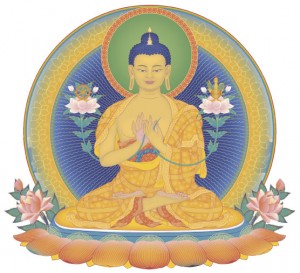Rebuilding Buddhism in Russia
It is not generally known in the West, but the pre-revolutionary Russian Empire had a substantial number of Buddhists who practised in the Tibetan tradition. In 1741, Empress Elizabeth issued a decree recognising Buddhism, alongside Orthodox Christianity, as an officially sactioned religion in Russia..
For 180 years Russian Buddhists were allowed religious freedom by the Tsarist government. They established temples and monasteries, chiefly in Central Asia and in Siberia in the Lake Baikal area. But this policy of tolerance changed drastically after the communist revolution.
In Marxist countries most religions were suppressed to a greater or lesser extent, but in Russia Buddhism was a particular object of persecution. The reason for this is clear, for unlike the other belief-systems that Marxism encountered in Eastern Europe and Central Asia, Buddhism was the only one which offered a rational, logically coherent philosophy which presented a real ideological threat to the Marxist materialist worldview. (See Marxism). In fact, the future Buddhist Prime Minister of Mongolia - Nambariin Enkhbayar - first became interested in Buddhism when, as a student, he was subjected to anti-Buddhist indoctrination by his Soviet Communist 'educators'.
In the 1920's, as Joseph Stalin consolidated his power, most of the temples and monasteries were destroyed, and many Soviet Buddhists were executed or worked to death in the notorious Gulags. Pockets survived in the remote regions of Buryatia, Kalmyck Republic and Tuva. With the restoration of religious freedom, Buddhism is now being re-established in these areas, though as in Mongolia the process is under threat from lavishly-funded American Christian evangelists who are targeting Kalycks, Buriats and Tuvinians as 'unreached peoples'. Hopefully this blatant cultural imperialism and meme-peddling will not succeed in destroying these vulnerable indigenous cultures.
In addition, new Buddhist centres are being established outside the traditionally Buddhist areas in cities such as Moscow, St Petersburg, Obninsk, Nizhni-Novgorod, Petrozavodsk and Varonesh.
From http://web.archive.org/web/20071110122249/http://home.btclick.com/scimah/
Arguments against Buddhism - the best way to understand the strengths of a philosophy is to attempt to refute it!
Buddhist
Teachings
on the mind, personal relationships, meditation and the spiritual path.
Russians find solace in Buddhism
Buddhism in Russia (Russian language website)
The Three Poisons Hatred, Ignorance and Desirous attachment.
Cultural Imperialists:
Christian Plans to convert Tuva Buddhists
Christian Plans to convert Kalmyk Buddhists
Christian Plans to convert Buryat Buddhists
RATIONAL
BUDDHISM
If we regard Buddhism as a combination of a philosophy, psychology and religion, then how
much mileage can we get from the first two aspects before we have to start invoking
religious faith?
Christian versus Buddhist worldviews
